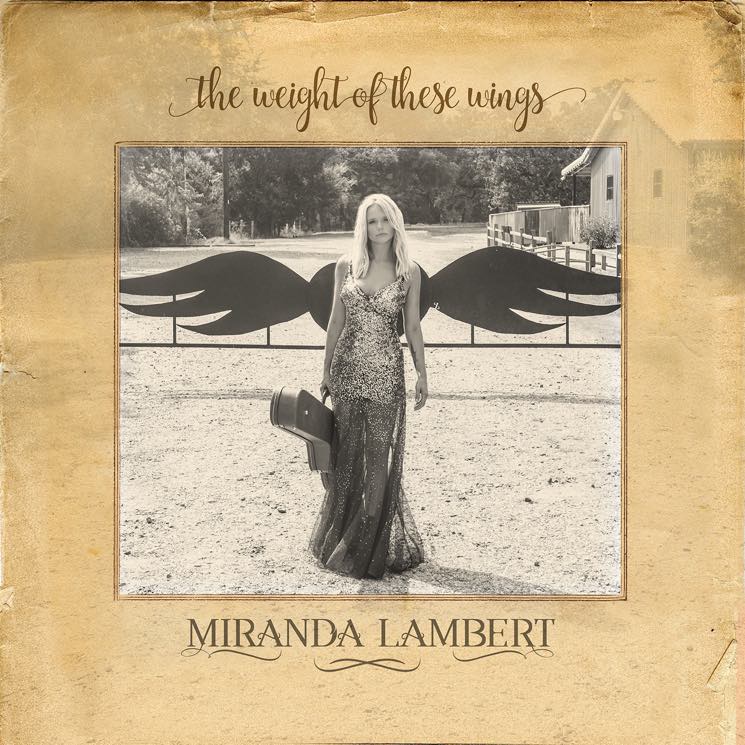When first single "Vice" was released, I hoped that The Weight of These Wings would be Miranda Lambert's Blood on the Tracks. Considering how sophisticated that song was, I was even hoping for an album as good as Tammy Wynette's D-I-V-O-R-C-E, a baroque work of broken feelings, of self-loathing over bad men and worse relationships. But Blood on the Tracks is over in 10 tracks, less than an hour, and Tammy Wynette does the same job over 11 songs and 29 minutes. Lambert's new full-length is 24 songs over two discs.
If it was ten songs, it could have been a tightly contained narrative about the pull of vice and its logical consequences. "Vice" here is not only a metonym for sex; like "Smoking and Drinking" or "Little Red Wagon" off 2014's Platinum, it's about a whole catalogue of vices, including leaving too soon, drinking whiskey, spending too much time at the bar, her vagabond ways, an ambivalent relationship with Christianity and the totemic power of cheap plastic sunglasses.
However, when she sings about sex, Lambert's at full strength. The hint of it in "Vice," about how she can not avoid what's terrible for her, leads into "Smoking Jacket," a smouldering torch song about claiming pleasure and refusing moralism with a serpentine guitar line and languorous percussion. The whole song moves between countrypolitan, cabaret and chanson, picking up the cleverness and eroticism of all of those forms. Written by Lambert herself, Natalie Hemby and Lucie Silvas, it features lines like "I want a man who knows his status / and makes a habit of loving me as it burns," and, "I want a man with a smoking jacket / and a car which is classically bourgeois."
The best, perhaps, is "We go together / like nicotine and Chanel," and when the album works, it goes together just like that. The cleverness of songs like "Smoking Jacket" is deepened by the simple story well told "Pushin' Time" and the heartbreaking "Getaway Driver." But there are a few clunkers here. The nostalgia of "Tomboy" doesn't work thematically, and "Covered Wagon" is placed too close to the end of the first disc. Also, as much as I love "Pink Sunglasses" or the working class solidarity of "We Should Be Friends," it doesn't work as well as similar songs on previous albums.
But these are minor complaints, and there's a masterpiece of a divorce album hidden in here. Cobble together "Vice," "Smoking Jacket," "Pushin' Time," "Runnin' Just in Case," "Use My Heart," "Well Rested," "Covered Wagon," Ugly Lights" and "Bad Boy" in roughly that order, and you have a lasting classic — almost as good as Tammy or Dylan.
(Sony)If it was ten songs, it could have been a tightly contained narrative about the pull of vice and its logical consequences. "Vice" here is not only a metonym for sex; like "Smoking and Drinking" or "Little Red Wagon" off 2014's Platinum, it's about a whole catalogue of vices, including leaving too soon, drinking whiskey, spending too much time at the bar, her vagabond ways, an ambivalent relationship with Christianity and the totemic power of cheap plastic sunglasses.
However, when she sings about sex, Lambert's at full strength. The hint of it in "Vice," about how she can not avoid what's terrible for her, leads into "Smoking Jacket," a smouldering torch song about claiming pleasure and refusing moralism with a serpentine guitar line and languorous percussion. The whole song moves between countrypolitan, cabaret and chanson, picking up the cleverness and eroticism of all of those forms. Written by Lambert herself, Natalie Hemby and Lucie Silvas, it features lines like "I want a man who knows his status / and makes a habit of loving me as it burns," and, "I want a man with a smoking jacket / and a car which is classically bourgeois."
The best, perhaps, is "We go together / like nicotine and Chanel," and when the album works, it goes together just like that. The cleverness of songs like "Smoking Jacket" is deepened by the simple story well told "Pushin' Time" and the heartbreaking "Getaway Driver." But there are a few clunkers here. The nostalgia of "Tomboy" doesn't work thematically, and "Covered Wagon" is placed too close to the end of the first disc. Also, as much as I love "Pink Sunglasses" or the working class solidarity of "We Should Be Friends," it doesn't work as well as similar songs on previous albums.
But these are minor complaints, and there's a masterpiece of a divorce album hidden in here. Cobble together "Vice," "Smoking Jacket," "Pushin' Time," "Runnin' Just in Case," "Use My Heart," "Well Rested," "Covered Wagon," Ugly Lights" and "Bad Boy" in roughly that order, and you have a lasting classic — almost as good as Tammy or Dylan.
